

One in ten teachers taking antidepressants to cope with work stresses. Excessive workloads and lack of support are making teachers depressed “to the point of suicidal tendencies”, new figures reveal, prompting fresh concerns for teacher welfare.

Evidence presented from 4,908 teachers across the country suggests more than one in 10 are taking antidepressants to cope with work stresses. Six in 10 teachers say their job has impacted on their mental health in the past 12 months, and many reported turning to alcohol, medication and other drugs as a coping strategy. The survey, led by the NASUWT union, found 12 per cent of respondents had undergone counselling in the past year and 11 per cent – slightly higher than the national average – had used or increased their reliance on anti-depressants.
Democratizing digital learning: theorizing the fully online learning community model. As an offshoot of the CoI, FOLC diverges in several ways.
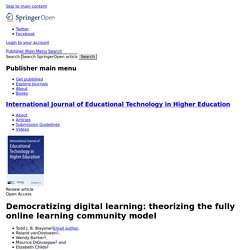
Firstly, although CoI theorizes a Social Presence (SP), Cognitive Presence (CP), and Teaching Presence (TP), FOLC incorporates SP and CP only. It subsumes TP fully within the other presences. CanadaStudyExecSumm2016. Canada Study. Coinciding with the 2016 Annual Conference in Vancouver, British Columbia, Learning Forward commissioned and supported a study of professional learning across the nation of Canada.
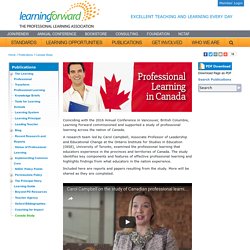
A research team led by Carol Campbell, Associate Professor of Leadership and Educational Change at the Ontario Institute for Studies in Education (OISE), University of Toronto, examined the professional learning that educators experience in the provinces and territories of Canada. The study identifies key components and features of effective professional learning and highlights findings from what educators in the nation experience. Included here are reports and papers resulting from the study. More will be shared as they are completed.
Supporting Teachers. As a physics network coordinator (PNC) in London for 10 years and a teacher for nearly 20, I’ve worked alongside, and supported, many teachers with different experiences and science backgrounds...
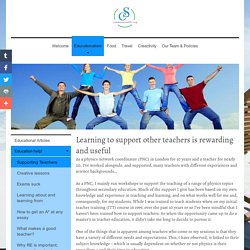
As a PNC, I mainly run workshops to support the teaching of a range of physics topics throughout secondary education. Much of the support I give has been based on my own knowledge and experience in teaching and learning, and on what works well for me and, consequently, for my students. While I was trained to teach students when on my initial teacher training (ITT) course in 1999, over the past 10 years or so I’ve been mindful that I haven’t been trained how to support teachers.
So when the opportunity came up to do a master’s in teacher education, it didn’t take me long to decide to pursue it. Fact or fiction? The reasons teachers choose the job – and quit. What makes people become teachers?
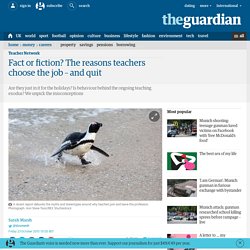
And why do so many of them quit? Amid ongoing concern about teacher shortages, a new report explores these questions. What does research really say about iPads in the classroom? Two educators put the research to the test.

When (and how) are iPads most effective? Popular mobile devices may come and go, but the iPad has remained a hit in the K-12 classroom. Hook vs. Do Now: Why Inquiry Trumps Compliance. The first lesson I ever taught was in Pachamama, Ecuador.
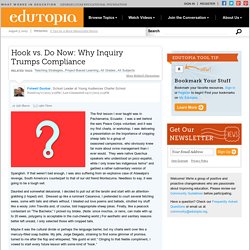
I was a wet behind the ears Peace Corps volunteer, and it was my first charla, or workshop. I was delivering a presentation on the importance of cropping sheep tails to a group of seasoned campesinos, who obviously knew far more about ovine management than I ever would. They were native Quechua speakers who understood un poco español, while I only knew two indigenous terms* and garbled a rather rudimentary version of Spanglish. Leave research to the academics, John Hattie tells teachers. Teachers should avoid becoming researchers in their classrooms and leave the job to academics, according to one of education’s most influential professors.
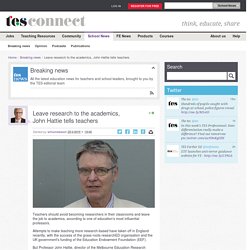
Attempts to make teaching more research-based have taken off in England recently, with the success of the grass-roots researchED organisation and the UK government's funding of the Education Endowment Foundation (EEF). But Professor John Hattie, director of the Melbourne Education Research Institute and one of the world’s most widely quoted education academics, is concerned that the movement should not lead to teachers trying to conduct their own research. Things I Can Say About MFA Writing Programs (As a Teacher) Now That I No Longer Attend One I recently took a leave of absence after teaching for over ten years from kindergarten to the university level in New York City.
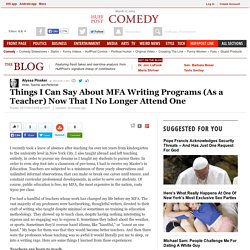
Building an Authentic Culture of Professional Learning. Many sectors, including education, acknowledge that learning does not end when formal training does.
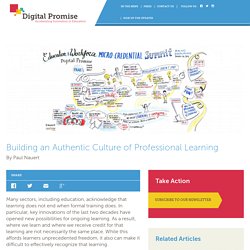
In particular, key innovations of the last two decades have opened new possibilities for ongoing learning. As a result, where we learn and where we receive credit for that learning are not necessarily the same place. While this affords learners unprecedented freedom, it also can make it difficult to effectively recognize that learning. Micro-credentials present an opportunity to address this challenge. Specifically, educators can pursue micro-credentials, sharable as digital badges, to gain recognition for competencies they demonstrate throughout their careers, regardless of where it happens.
Fotl_sc_ss13_profidentity.pdf. A Principal's Reflections: Looking at Teacher Accountability Through a New Lens. Is Teaching A Profession? For the last 50 years, educators have devoted a great deal of energy to the debate over whether teaching can be considered a profession. Professional: The misleading question of teaching as a profession. There are several ways to think about professionalism in teaching — should we look at the similarities between established professions such as medicine and law or should we reevaluate what it means to be a ‘profession’?